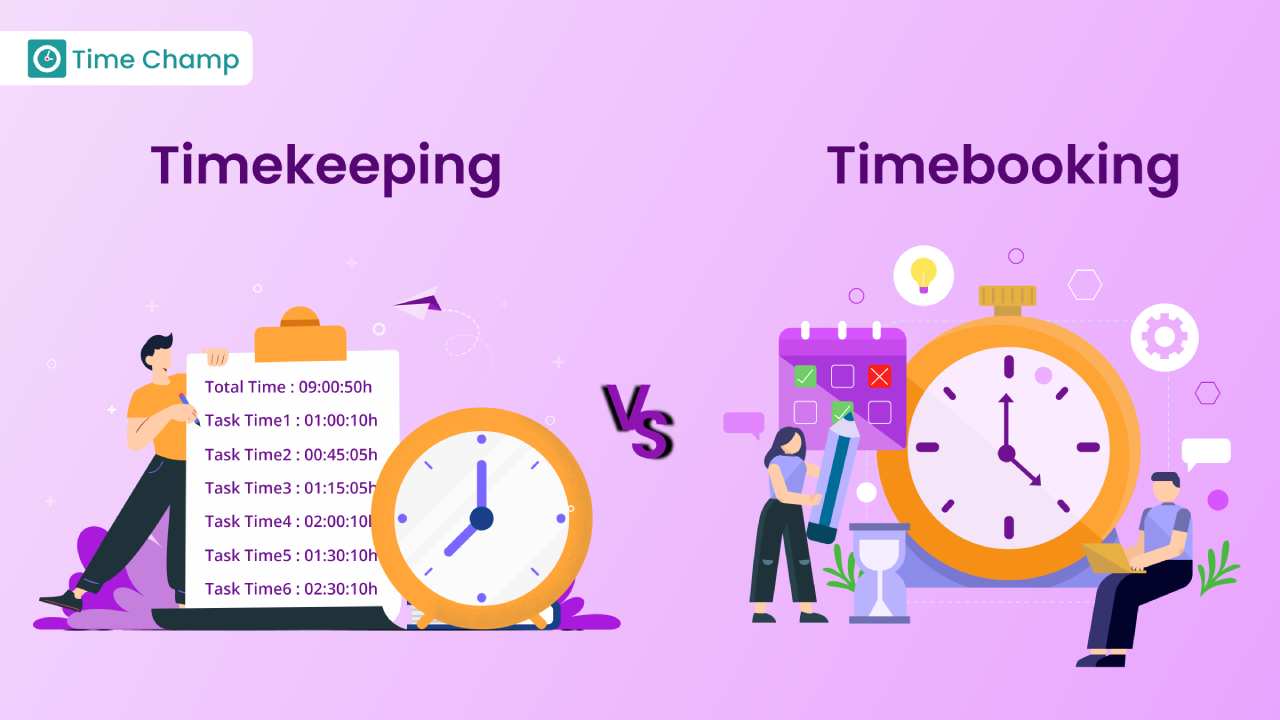Are you struggling to understand the difference between timekeeping and time booking? You’re in the right place. Both play crucial roles in managing time effectively, but they address different aspects of your schedule. Dive deeper to uncover how each can make a significant impact on your daily operations and discover how you can use them to optimize your time management.
What is Timekeeping?
Timekeeping is the act of keeping track of the working hours of individuals or teams. It is one of the most critical determinants of time management and ensuring that time is utilized effectively.
The most basic method of timekeeping is the recording of the working hours and the intervals in between. This process can be done manually with the help of time logs or with digital timekeeping systems.
Timekeeping can also help in:
-
Assists in preventing errors in the computation of the payroll since it captures the actual working hours.
-
Helps in monitoring the amount of time taken to complete tasks and projects.
-
Ensures compliance with labor laws and provides necessary documents.
-
Supports in proper planning and use of resources because records are kept in detail.
-
Assists in providing performance and productivity reports of the employees for evaluation.
What is Time Booking?
Time booking refers to the act of planning and setting aside a particular time for an activity, a meeting, or a resource. It is useful for planning the day or week and for making sure that time is used properly.
Time booking is the process of scheduling time for different activities to be done, and it assists in organizing the calendar to avoid clashes. This can be done by traditional methods such as using a planner or through the use of digital applications and software.
Time Booking can also help in:
-
Schedules meetings and tasks in a way that assigns a particular time for them.
-
Enhances coordination among the team members since it determines when and where activities take place.
-
Reduces time wastage by making sure that there are set times for each activity.
-
Enables you to schedule in a more advanced manner, which can help in the management of projects and the achievement of goals.
-
Assists in monitoring progress and obligations since time is well described with commitments.
Difference Between Timekeeping and Time Booking
To understand how work hours and tasks should be planned, it is necessary to distinguish between timekeeping and time booking. Both are important in the operation of the business, but they are distinct in their functions. Knowledge of these differences helps you to work within time and not sacrifice working hours and other activities. Here’s a breakdown of how they differ:
| Aspect | Timekeeping | Time booking |
|---|---|---|
|
Definition
|
Process
of
documenting
and
monitoring
the
number
of hours
that
individuals
or teams
spend on
work. It
entails
recording
the
precise
time an
employee
begins
working,
the time
they
depart,
and the
time
they
take a
break.
|
Process
of
planning
and
setting
apart
certain
times
for
certain
activities,
meetings,
or
resources.
It is
concerned
with the
scheduling
of
future
activities
and
ensuring
that
time is
allocated
efficiently.
|
|
Purpose
|
The main
purpose
of
timekeeping
is to
enable
to
remunerate
the
employees
based on
the
number
of hours
they
have
spent at
work. It
also
helps in
monitoring
the
performance,
managing
working
time,
and
compliance
with the
labor
laws.
|
Time
booking
aims to
allocate
time for
different
activities
such as
meetings,
projects
or
utilization
of
certain
resources.
It helps
in the
management
of
schedules,
clashes,
and the
right
and
proper
utilization
of time
and
resources.
|
|
Methods
|
Manual
methods
of
timekeeping
include
time
logs or
time
cards
where
the
employees
have to
write
down the
time
they
have
worked.
It can
also be
done
through
the use
of
timekeeping
devices
such as
digital
timekeeping
systems
like
Time
Champ
that
record
the
working
hours.
|
It is
usually
done by
means of
planners,
digital
calendars,
or
scheduling
software.
These
tools
enable
users to
schedule
particular
time
intervals
for
activities,
meetings,
or any
other
planned
events.
|
|
Usage
|
Often
used in
organizations
that pay
hourly
wages or
where
the
attendance
of
employees
needs to
be
closely
supervised.
|
Widely
used in
situations
where
project
deadlines
are
important
and
where
time has
to be
saved to
increase
productivity.
|
Conclusion
In conclusion, timekeeping and time booking are two different but interrelated concepts that help to regulate working hours and plan tasks. Timekeeping is all about documenting the time spent on work while time booking is about scheduling and managing time for certain tasks. Both are very important in the management of time. These processes can be easily integrated with Time Champ so that you can get the best of your time and tasks.
Streamline your workforce time tracking and management with Time Champ!
Get started today and optimize every second to boost efficiency.
SignUp for FreeBook DemoFrequently Asked Questions
Features of timekeeping systems includes, work-hour tracking, real-time tracking, payroll and human resource integration, reporting, compliance, and easy-to-use interfaces. These features assist in time management and record keeping to avoid cases of missing out on important information.
Yes, timekeeping and time booking are related since they both help in managing time effectively. Timekeeping records the real working hours, while time booking plans the tasks and activities. When both are used, time management is enhanced since time tracking is accurate and time scheduling is well done.
Best practices include having clear and specific time assignments, updating the schedule frequently, having priorities, compatibility with other tools, and reviewing, changing bookings according to the actual progress and feedback to avoid clashes.
Time booking is a way of avoiding the overlapping of activities by scheduling a certain time for certain activities and meetings. This clear scheduling also helps in identification of resource and activity conflicts hence making it easier to manage and allocate the resources.





